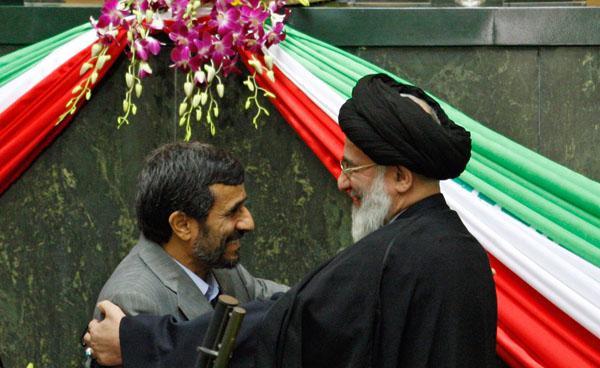Advertisement
Ahmadinejad Sworn In As Iranian President

Mahmoud Ahmadinejad was sworn in Wednesday for a second term in office as president of Iran, appealing for national unity and denouncing foreign interference in his inauguration speech before parliament.
Ahmadinejad took the oath and pledged to protect the constitution but his inauguration speech was unusually soft-toned for the bellicose Iranian leader. He focused on foreign policy, saying he would make it "stronger and with more effective new plans."
"I hereby swear by the almighty God to protect the system of the Islamic Revolution and the constitution, I will spare no effort to safeguard the frontiers of Iran," Ahmadinejad said. He urged for unity and said: "We should join hands as we move forward to fulfill our goals."
Ahmadinejad did not directly address the massive street demonstrations against his proclaimed election victory, but said his government would "resist any violation of law and interference."
"We will not remain silent, we will not tolerate disrespect, interference and insults," he said.
Top officials and clerics attended the ceremony, which was boycotted by opposition leaders and moderate lawmakers.
Election Opposition Remains, But Streets Quiet
Iran's opposition has claimed Ahmadinejad stole the vote in the June 12 presidential elections and there have been mass street protests that have shaken the country's religious leadership. At least 30 demonstrators have been killed in the uprising, according to the authorities.
Hundreds of policemen were deployed around the parliament Wednesday, while a subway station nearby was closed to the public.
Opposition groups had called protesters again to the streets to coincide with the inauguration, with the calls posted on reformist Web sites and blogs — including some linked to opposition leader Mir Hossein Mousavi — indicating the protesters' determination to continue confronting the establishment.
The official IRNA news agency said there was no "disturbance of the peace" on major streets and roundabouts in the Iranian capital during the inauguration but eyewitnesses said at least 10 people were detained by police.
Security troops also dispersed hundreds of protesters who chanted "Death to the Dictator" in nearby streets, according to the eyewitnesses. Authorities have banned media from covering the street protests, forcing them to rely on eyewitness accounts.
The eyewitnesses said the detained included protesters who wore black T-shirts in a sign of grief over Ahmadinejad's inauguration and a young man in green trousers — the color of Mousavi's movement — along with a middle-aged woman carrying a royalist banner in support of Shah Mohammad Reza Pahlavi who was toppled in the 1979 Islamic Revolution.
Looking Toward The Future
The inauguration followed an official endorsement of Ahmadinejad's presidency on Monday from Iran's Supreme Leader Ayatollah Ali Khamenei. Under the constitution, Ahmadinejad has two weeks to draft a Cabinet for approval in parliament.
Ahmadinejad also pledged to "uproot all sources of corruption" and move the economy forward, saying he believes he can "solve the problem of unemployment."
He made only a vague reference to the West and the U.S., which Ahmadinejad's camp has accused of backing the street protests.
"Some countries have not recognized the elections or extended their congratulations. They do not respect the rights of other nations, yet they recognize themselves as the yardstick for democracy," said Ahmadinejad.
"Nobody in Iran is waiting for anyone's congratulations," Ahmadinejad added, to cheers from lawmakers.
Before Ahmadinejad's speech, the head of Iran's judiciary, Ayatollah Mahmoud Hashemi Shahroudi, urged Ahmadinejad "not to use force ... on minor issues."
Many protesters have now broadened their anger toward the wider Islamic leadership, which they claim has trampled on their rights by recognizing the fraudulent election result.
Another cause for opposition anger is a mass trial scheduled to resume Thursday for more than 100 people, including many prominent reformist activists and political figures. They are accused of encouraging the protests and challenging the Islamic system.
The trial has brought widespread denunciations from reformists and some powerful conservatives — adding to the rifts within Iran's leadership over its handling of the most serious domestic upheaval since the 1979 Islamic Revolution.
This program aired on August 5, 2009. The audio for this program is not available.